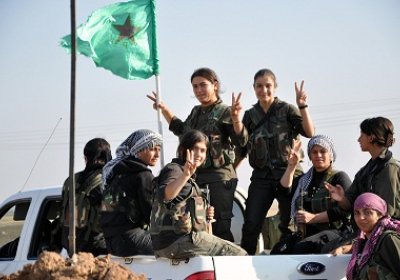 Turkish-backed terrorists have massacred civilians in Kobanê. Photo: Kurdish Resistance & Liberation/Facebook.
Turkish-backed terrorists have massacred civilians in Kobanê. Photo: Kurdish Resistance & Liberation/Facebook.
Syria
 Turkish-backed terrorists have massacred civilians in Kobanê. Photo: Kurdish Resistance & Liberation/Facebook.
Turkish-backed terrorists have massacred civilians in Kobanê. Photo: Kurdish Resistance & Liberation/Facebook.
Washington DC was the converging point for some of the world’s most oppressive regimes on May 13 and 14, when President Barack Obama hosted a billionaire conglomerate known as the Gulf Cooperation Council (GCC). The group consists of the Middle Eastern countries of Kuwait, Bahrain, Saudi Arabia, Qatar, UAE and Oman.
The cosy US-GCC relationship exemplifies the twisted nature of US foreign policy, especially in regards to Saudi Arabia. Saudi Arabia has been accused of human rights violations against its own citizens, including political activists, journalists, and women.
War planes from the US and its allies bombed the village of Birmehli in northern Syria on the night of April 30. US Central Command spokesperson Major Curtis Kellogg claimed that at least 50 fighters from the self-styled Islamic State (IS) group were killed and there was “no indication that any civilians were killed”.
However, human rights groups, including the Britain-based Syrian Observatory for Human Rights (SOHR), have reported that all the casualties were civilians: 64 people, including 31 children.
About 800 refugees were drowned in the Mediterranean on April 18 when a boat carrying them from Libya, and trying to reach the south of Italy, capsized. Just three days earlier, more than 400 people drowned when another boat on the same route sank. Refugee deaths in the Mediterranean are rising sharply. “According to the UN and the International Organisation for Migration, 1,776 people are dead or missing so far this year, compared with 56 for the same period last year,” the April 24 Guardian reported.
Meral Cicek (pictured) is the chair of Kurt Kadin Iliskiler Merkezi, the Kurdish Centre for Women's Affairs in Erbil, in the autonomous Kurdish Region in northern Iraq).
Cicek spoke to the Rosa Luxemburg Foundation’s Florian Wilde during the World Social Forum (WSF) in Tunis last month. It has been translated by Leandros Fischer.
* * *
Fears over the safety of the 18,000 civilians trapped in Yarmouk, south of the Syrian capital of Damascus, have grown following reports that the Islamic State (IS) terrorist group has taken control of large areas of the Palestinian refugee camp.
The IS, notorious for its brutal execution of hostages in the areas it occupies in Iraq and Syria, infiltrated Yarmouk camp on April 1.
An unprecedented climate change-fueled drought contributed to the political unrest in Syria, says a new paper published in the Proceedings of the National Academy of Sciences, the Huffington Post reported on February 3.
The article said the Syrian drought, which began in late 2006, dragged on for three years and was the worst on record.
In the more than four years since mass uprisings ousted dictatorial regimes in Tunisia and Egypt, it can seem that the initial hopes represented by these mass movements lie in tatters.
Libya, Syria, Yemen and Iraq remain mired in bloody armed conflicts that have led to the deaths of hundreds of thousands and displaced millions more within and across borders.
In the pivotal case of Egypt, military rule has returned through the violent crushing of protests, the arrests of an estimated 40,000 people and the rebuilding of the repressive structures of the Hosni Mubarak era.
A largely unknown region to the rest of the world became one of the most talked about globally in recent months.
Kobane is a town that suffered a too-harsh fate. Innocent civilians never think that one day they would face massacres — except that being a Kurd in a town like Kobane (in a largely Kurdish area in the north-west of the Syrian state), means you face such things.
The self-styled Islamic State (IS) may be one of the few unifying forces in the Middle East.
A range of mutually antagonistic regional and global powers and non-state groups have joined the fight against them. While Western politicians’ pronouncements that the IS has declared war on the world are clichéd, they are echoed by the group’s own statements.
Why Kobane did not fall
By Dilar Dirik — After 135 days of fearless resistance, the people of Kobane have liberated the city from the so-called Islamic State (IS). Since September 2014, the YPG and YPJ (People’s and Women’s Defence Units) have been leading an epic and unbelievable resistance against the latest wave of attacks by the IS.
South Africa’s electricity crisis: muddle through, meltdown or miracle?
The world has started looking at Kobane and the other two liberated cantons of what the Kurds call Rojava (Western, or Syrian, Kurdistan) since the resistance in Kobane liberated the town from the brutal Islamic State (IS) forces.
Their success is not good news for Turkish President Recip Tayyep Erdogan, achieving a symbolic victory against an underhanded ploy by Turkey’s regime to crush Kurdish resistance in Syria and weaken the Kurdish resistance against the Turkish state.
- Previous page
- Page 12
- Next page










